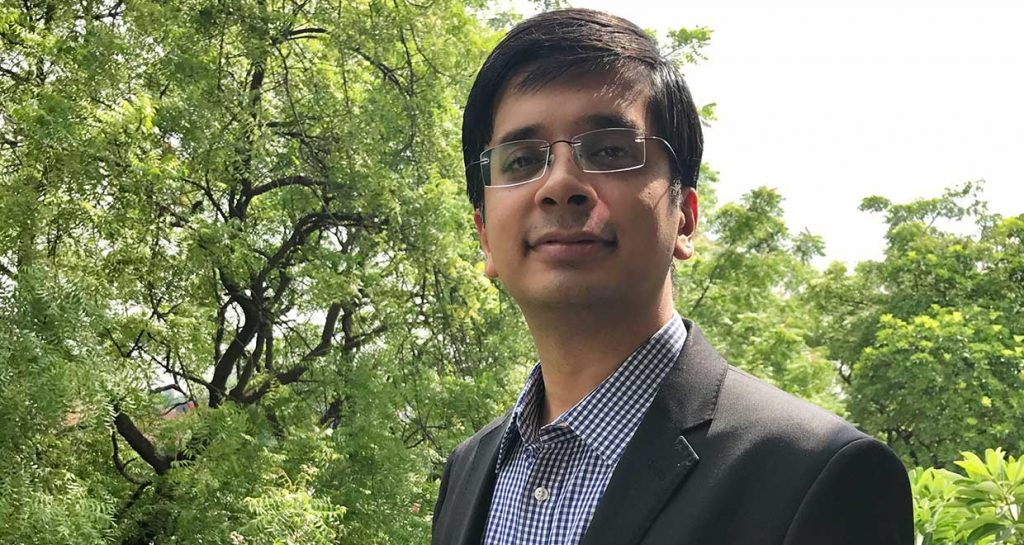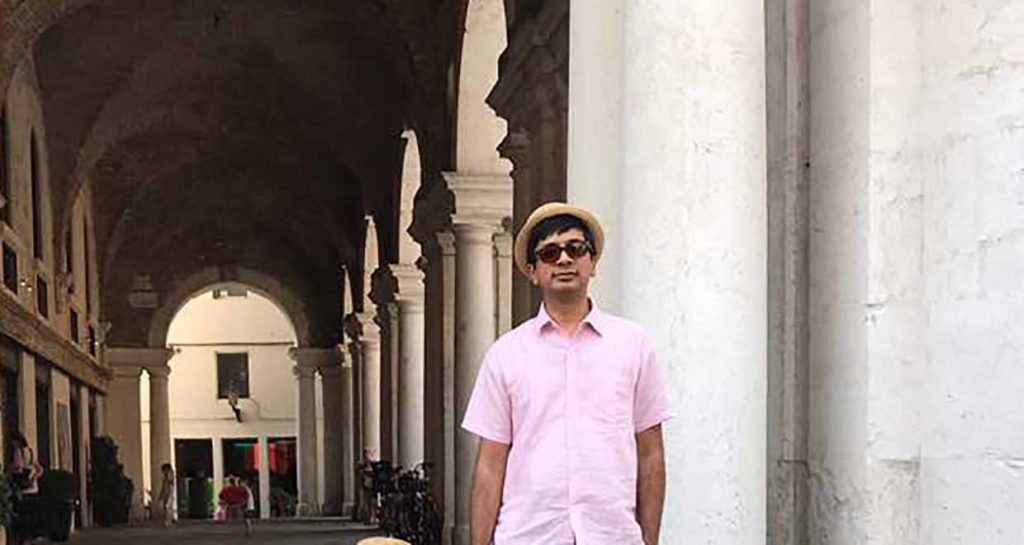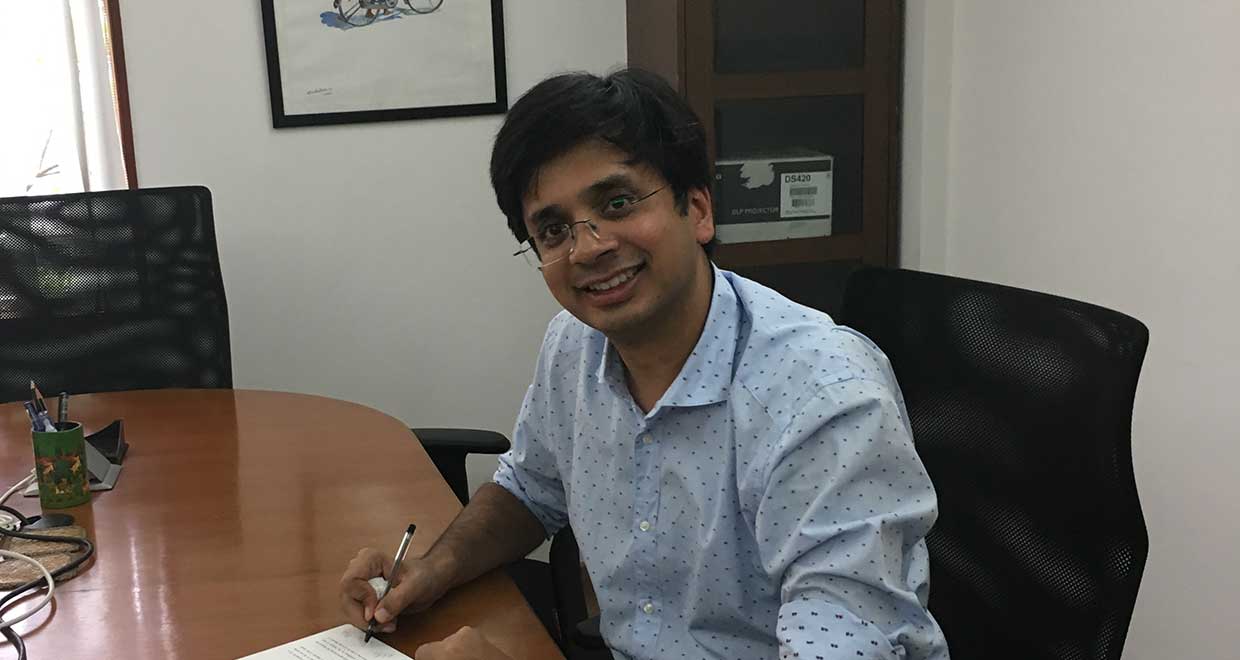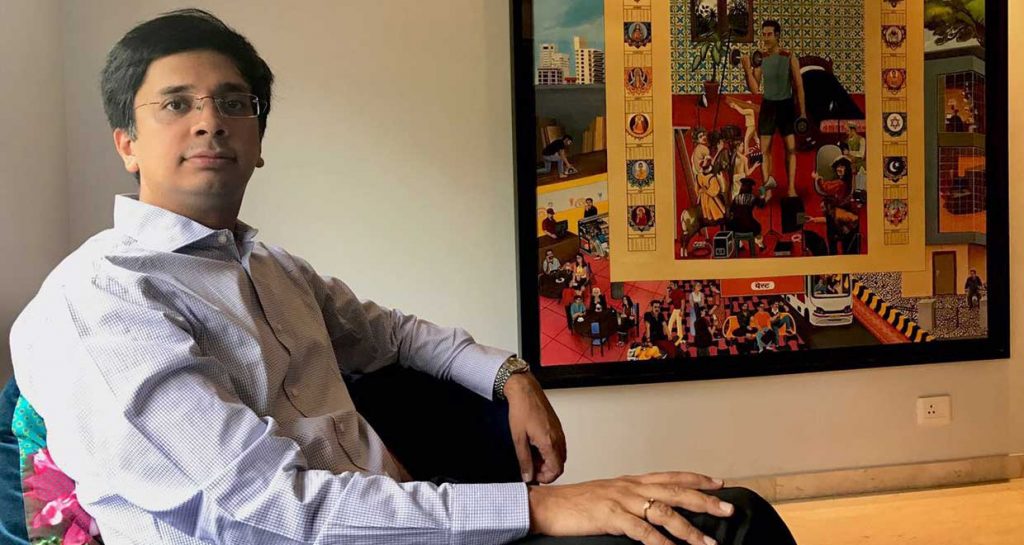Arjun graduated from NLSIU, Bangalore, in 2005. Thereafter, he received the Inlaks Scholarship to study at New College, University of Oxford, in the prestigious BCL programme. Since 2006, he has been practicing in India. Between 2006-2011/12 he was the junior of Gourab Banerji, Sr. Advocate & Barrister. In 2012, he took the Advocate-on-Record exam, and was awarded a silver medal and the Mukesh Goswami Memorial Prize for obtaining the 2nd rank in the Supreme Court’s AOR examination. Thereafter, he branched out and set up an independent legal practice.
In this interview we speak to him about:
- His time at NLSIU
- Preparing for the AoR examination
- His new role at Samvad Partners
How would you like to introduce yourself to our readers? Do you come from a family of lawyers?
I do not come from a family of lawyers. Some of my more distant relatives were lawyers, but that did not influence my career, or my decision to pursue law. Having said that, I am from what you would call an ‘upper middle class’ background. Where you start from does make a difference to where you end up – without that I probably wouldn’t have made some of the decisions or taken some of the opportunities that came my way. Perhaps, these choices or opportunities would not have presented themselves to persons who were not as in the same position as me.
What was it that got you interested in the legal field?
When I started my legal education, I had no idea about the law, other than the distorted picture of what cinema and television gave us in the late 1990s. My father had a big role to play. He was keen that I join a profession, and had heard about the National Law School at Bangalore. He encouraged me to give the entrance exam (there was no CLAT back then), which I did. I passed – I was last on the list of candidates who made it. In retrospect, I was quite lucky, because my 12th Standard board exam performance was not exactly stellar. I got into the legal profession without knowing anything about it.

How was your experience in NLSIU?
Simply put, it was a defining and enriching experience – the value of which is inestimable. In every way – socially, intellectually, morally – I think I came out of the institution a better version of myself. And everyone there made a big contribution in this. We had some excellent professors. They taught students to question and challenge what they had read about. This is a really important skill for a lawyer – we do this every day, sometimes without thinking. Here I must commend the multi-disciplinary approach at NLSIU. We had to read history, economics and political science apart from the law. In my experience, it was our history professor – Dr. V.S. Elizabeth, who first taught us to challenge and question some of things we took as gospel truth. I hope she reads this and knows what a great contribution she made. There were a number of others who were great teachers in their own way – Prof. Jayagovind, Prof. Ramakrishna, Prof. U.R. Rai, Prof. A.K. Rai, Prof. Ramesh, and many more.
But more than anything else, it was the other students there who challenged you to do better and be a better person all the time. My closest and best friends are all from my college days. All law students should make the most of their years in college. The lessons learnt outside the classroom are generally the more important ones.
As far as extra-curricular activities were concerned, I was part of the Literary and Debating Society. Quizzing was very big in Bangalore back then. We reached the semi-finals of University Challenge, a TV Quiz Show. A team that I was part of was ranked second in the State of Karnataka. Frankly, I found mooting to be quite boring, though it does teach you a lot of skills you can use in the practice of law. I think legal writing is far more important. I did some of that – writing articles and trying to get them published in journals. As a lawyer, the ability to put across legal arguments clearly in the written form is a valuable skill – whether you end up as a corporate lawyer or as a disputes lawyer.
I don’t really count internships as extra-curricular because they were a part of the curriculum when I was at NLS. We got grades based on the feedback the lawyers would give the interns and based on what we did during the internships. I think its important to take internships seriously. What to do after law school is a difficult choice, at the best of times. It is important to try out different kinds of legal work to see what suits your personality.
Did Law School prepare me for the real world? – yes and no. I think legal practice is very different from learning about the law. Nothing can prepare you for all the things you are going to face when you get into a law office.
But some of the skills you learn in law school can help you a great deal in legal practice. Firstly, the basics are important – contract law, criminal law, property, constitutional law, tort – without this you will spend a lot more time struggling in the initial years. Secondly, you don’t need to know all the law, but you do need to know where to find it. I can’t stress the importance of good legal research skills in the workplace enough. By this, I don’t just mean being skilled at using a legal database (though that is also important nowadays) – you have to know where to start. Usually, this is with the statute itself or with a good book.
What were your areas of interest in law school? How did you recognise and cultivate such interests?
In law school, I used to be very interested in Intellectual Property as a subject. I read a lot about the subject, attended all the talks and lectures about this field. I even took on the assignment of being a teaching assistant. Alas, the charm wore off when I joined legal practice. As a subject, I think it is more interesting in the books, than in actual practice. Competition law, on the other hand, continues to be of interest to me. I have been fortunate to be able to work with the Competition Commission of India on a number of cases.
Can you describe your experience at Oxford?
The whole Oxford experience was nothing short of magical. I went to New College (which ironically was founded in 1379, as the New College of St. Mary of Winchester at Oxford). It really is the most magnificent and beautiful place. I was fortunate to be amongst an amazing group of graduate students, from across disciplines.
I think in terms of quality and teaching methodology, there is no course like the BCL at Oxford. Its one of the few graduate courses where there is a tutorial system – essentially either individually or a small group of students sit together with the law tutor to discuss the law. We were taught by some of the leading lights in their respective fields. For instance, Conflict of Laws was taught by Professors Adrian Briggs and Edwin Peel. One course which stood out for me was Philosophical Foundations of the Common Law – I could actually make connections between jurisdprudence and the actual practice of law.
I was very fortunate to be awarded a scholarship by the Inlaks Foundation to cover almost all my expenses of studying abroad. I am not sure if the process remains the same – but there was a written application and two rounds of interview. During the final round there were at least a dozen people in the room, all past scholars and some of them famous personalities who were instantly recognizable. It was quite inspiring to see what people had gone on to do after being awarded an Inlaks scholarship.
How can students increase their chances of obtaining a scholarship? Working hard and getting good grades is very important. There is no substitute for that. Other than that, you have to set yourself apart from the crowd. Another very important thing is your references – be it professional or academic ones. Unless you were able to impress your professors and senior colleagues at work, you are unlikely to get good references.
What are your views about the importance of further studies beyond the undergraduate level?
There are two or three aspects to this, from the point of view of someone who doesn’t want to pursue an academic career but become a practising lawyer. The first is that it’s a great experience – in and of itself. You do learn to think about the law in new and different ways. If the graduate degree has a specialisation, then this would certainly help your career in that specialised field. The second thing to know is, further studies will not make you a more successful lawyer. Just because you have an LLM doesn’t mean that you are better than the rest. The qualities that go into the making of a successful lawyer in this country have more to do with hard work, perseverance, the ability to interact with and impress clients, and most of all – a healthy slice of good fortune. The third thing is – money. Further studies (particularly abroad) can be quite expensive. If you cannot afford it, or you do not have funding, then you should not worry too much about further studies. It will not make or break your career. But if you can (afford it) – go for it!
What made you decide to litigate instead of taking up a job at a law firm, which seems to be the trend these days?
When I was in Law School, I interned with a number of litigating lawyers. I also interned with a law firm. But I found that I found litigation more interesting – I could see myself doing that for the rest of my life. One of the persons I interned with was Gourab Banerji, a barrister and a Senior Advocate. He is one of the finest commercial lawyers in the country, and very fine human being. I was very sure that I wanted to work with him when I completed my studies. Working in his chambers as a junior advocate to Mr. Banerji was my first, and only job. Working with him gave me the skills and confidence I needed to begin practice independently.
But I couldn’t have done it without the support of my parents, who also live in Delhi. I always knew I had their support, and didn’t have to worry about paying rent or worry too much about money. Without the support of family –both financial and moral, practicing independently would have been a much bigger challenge than it was.
How did you prepare for the AoR examination?
(Arjun ranked second in the country in the AoR examination.)
It is not an easy exam, and I am firmly of the belief that you have to take some time off from work to prepare. I took a little over a month off, and tried to avoid going to court altogether. Luckily the exams are held in early June, and the Supreme Court closes in mid-May for the summer vacation. I think the key is to practice writing because finishing the paper and attempting all the questions can be very challenging.
Can you recall the first time you appeared in court, or a time you appeared in court for a significant matter?
I do remember my first significant appearance and it is a very vivid memory. It was a case in the regular hearing list of the Supreme Court, before Justice A.K. Mathur and Justice Dalveer Bhandari. The case had been in the regular list for months and it never used to reach. But that day, it did reach. My Senior, Mr. Banerji, was arguing a case in another court. The briefing counsel was also held up elsewhere. I was the only one there. I asked for a short adjournment, but the bench was not agreeable. They passed over the matter and told me to be ready to argue. I must confess, to my great embarrassment, that I was not prepared. I quickly went over the written notes, and when my turn came, I made my submissions to the Court to the best of my ability. I remember being extremely nervous and my hands were shaking. Eventually my Senior arrived and rescued me. I have to say that the Bench was extremely indulgent, and I will be forever grateful for that experience. It’s a reported judgment – “Nadia District Primary School Council v. Sristidhar Biswas & ors”. But I learnt a lesson the hard way – if you are holding a brief, be prepared to argue it, or at least know what it is about. It’s a story I always share with my junior colleagues in the hope that they will do better than I did, if caught in a similar situation.
As far as the attitude towards junior counsel is concerned (I can only speak from anecdotal and personal experience), I have had a varied experience. In the Delhi High Court, I think the experience, on the whole, has been that judges have been very patient and encouraging to juniors, as long as they are able to exhibit that they are well prepared. In the Supreme Court given the stage of proceedings, the time for presenting your point is quite short. It is a very difficult skill to put the best part of your case, anticipating what the Judges have in mind. For this reason, more experienced counsel tend to fare better.
What caused the decision to join as a partner at Samvad Partners?
There are a number of reasons. The primary reason was that I found that there are limitations to practising as an independent practitioner. Without the organisation and infrastructure that the law firm setup provides, it is not possible to meet the challenges posed by large commercial litigations. At the same time, being part of Samvad Partners does not mean I would have to give up on arguing cases, which I enjoy. It was a win-win for both Samvad, and me, personally. I have been interacting with them for quite some time now, and I was impressed not only with their professionalism but also their ethics. Another reason is that, whether we like it or not, the hitherto disorganised or unorganised legal market is tending towards greater organisation – in the form of partnership firms and LLPs. But after having practised as an independent practitioner, there are very few places that I could adjust to working in – Samvad Partners seemed to be the perfect fit for me. My role at Samvad is to grow their disputes practice in Delhi from the ground up, and in this, the firm has given me a lot of freedom and flexibility. Above all, Samvad is a partnership in the truest sense of the word – everyone gets their due and the work environment is underlined by compassion.

Can you give law students some advice on how to go about researching and drafting their work?
I think the important thing is to first concentrate on the written work that is part of the curriculum. Don’t plagiarise – when you start out at law school no one expects you to produce original academic research. Concentrate on in-depth research. Once you start seeing that there are two sides to every argument through your research, you will be ready to start writing something that may have a chance of getting published. To begin with try to get your articles published in the journal sections of law reports, and then move to peer-reviewed journals.
Generally speaking, what qualities are most important to succeed in the field of litigation and how can law students develop them?
Of course, hard work and perseverance are the most important qualities. But I have to admit that I was very naive when I joined the bar. If I had known how difficult it was going to be, I am sure I would have had second thoughts. I always used to wonder why do juniors in litigation get paid so little. After ten years of practice, I still think juniors are a terribly under-paid lot, though there has been an overall improvement in pay. But there is a flip-side to this. If I was paid handsomely, what incentive would there be to make a niche for myself and develop a clientele of my own?
Do you think arbitration is the future of dispute resolution in India?
I think arbitration has a future in India, but it is not the future of dispute resolution in India. Arbitration in India suffers from a lot of problems and we are quite a long way away from addressing them. Unless we sort out our problems with justice delivery through the system of courts, we can’t begin to address the real, practical problems facing arbitration in India today. The people who are stakeholders in the arbitration system are not different from the stakeholders in the court system. Lawyers in India (on the whole) take on too much work, and too much of that work is underpaid. They are not able to devote sufficient attention to any particular case. Wherever we see arbitration thrive in the west, schedules are maintained scrupulously. Part of the reason for this is that lawyers are incentivized to do this. So if a court hearing or arbitration is fixed for a particular set of dates, nothing else is scheduled around the same dates. A lot of things have to change for this to happen in India. This is just one example. As a result, arbitration is neither speedy nor cost effective. I think arbitration clauses are inserted into contracts nowadays without much thought. Nobody seems to be thinking – are we better off with or without an arbitration clause in this contract?

How do you stay up to date about the recent developments in all the fields you work in and have an interest in?
My Senior advised me to go through the loose/unbound parts of law reports as soon as they were delivered to the office. It was a great way to keep in touch with the latest judgments. Nowadays, things are much easier – all the updates come to your inbox or through social media!
What advice do you have for our readers who are primarily college students?
Whatever you do, enjoy yourself. If you don’t, you will regret it. These are the best days of your life and they won’t come back.

























